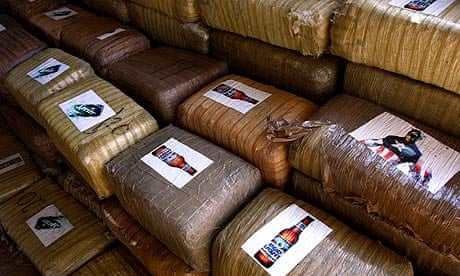The loudest voices in US drug policy debates call either for enforcing prohibition with ever-increasing ferocity or for giving up altogether by letting corporations legally sell the currently illicit drugs much as they do tobacco and alcohol. But as our colleagues and we detail this week in the Lancet (summary; subscription-only, there is an alternative: adopting drug policies with scientific evidence of effectiveness.
Accumulating research overturns some deeply cherished ideas in drug policy. For example, alternative development (eg, encouraging Colombians to grow flowers or Afghans to grow raisins instead of coca plant and opium poppy, respectively) has never had any documented impact on the price, availability or use of drugs on American streets. If we want to subsidise those foreign industries for their own sake, we should do so – but labeling such efforts as "drug control" programs is deceitful.
Another surprise: many criminally active heavy drug users can be induced to stop drug use without treatment. Rigorous evaluations of Hawaii's innovative Hope project have shown that felony probationers' methamphetamine use decreases by over 90% when a judge applies a regime of swift but mild sanctions for use, coupled with regular drug testing. Hope participants' rates of criminal offending and, hence, of returning to prison also dropped sharply. This exciting finding means that treatment – always in short supply – can be preserved for those who truly need it to stop using drugs.
What else does research tell us about treatment? We need both more treatment, which the Affordable Care Act (aka "healthcare reform") will provide, and also dramatically better treatment. Treatment regimes based on opiate substitution (eg, with methadone and buprenorphine) have strong scientific evidence of effectiveness. But even after 30 years of concerted effort, comparably effective medications do not exist for cocaine and methamphetamine. Various forms of psychotherapy, behavior management and self-help residential care, such as is provided by Oxford House, can help even hardened drug addicts enter the path of recovery, but need to be much more widely available.
Science also offers lessons about the effects of "getting tough" with drug suppliers. The most stunning characteristic of illegal drugs is how expensive they are: cocaine and heroin are semi-refined agricultural products, yet at retail they cost many times their weight in gold. Those high prices, which are solely due to the illegal status of drugs, substantially restrain use and dependence. Routine enforcement of the law is necessary to deliver those benefits.
Yet, highly aggressive enforcement does little additional good and has pernicious side-effects. The US has increased incarceration for drug-law violations literally tenfold since 1980 – without achieving more than temporary increases in prices. There would be little lost by halving the average sentence length for easy-to-replace functionaries within the drug distribution system (lookouts, typical retail sellers, hired hands, etc). It would also spare the public the enormous human and social costs of mass incarceration.
In contrast, while across-the-board toughness does little to suppress sales of long-established drugs, smart enforcement can be effective at controlling the violence and other toxic side-effects of drug markets. For example, targeted law enforcement efforts can deter dealers from killing (as in the Boston Gun Project) or dealing flagrantly (as in High Point, North Carolina).
To be sure, scientific evidence alone cannot determine our drug policy. Like everything our government does, drug policy must reflect society's values and the decisions voters make at the ballot box. But regardless of what goals for drug policy emerge from the democratic process, everyone wants the policies implemented in the service of those goals to be effective. That's where scientific research can be a valuable ally, if we have the courage and honesty to listen to solid evidence rather than anecdotes, intuitions and vain hopes.
